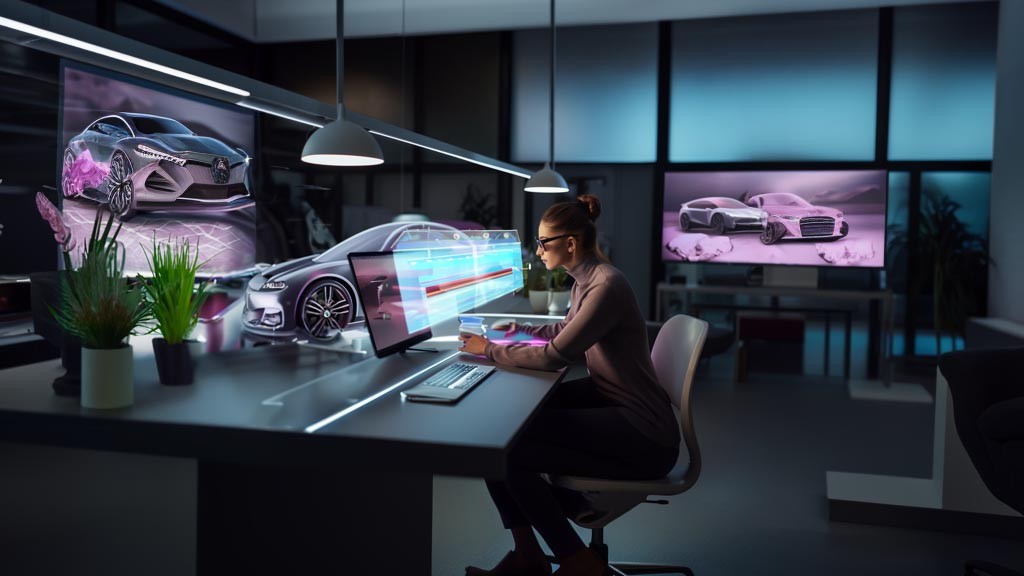Industry in Digital Transformation
The automotive industry, aircraft construction, manufacturing industry, and many other sectors are currently undergoing a digital revolution. Driving forces of this change are pioneering developments in the areas of accelerated computing, Artificial Intelligence (AI), and the industrial metaverse. For instance, car manufacturers like Tesla, BMW, and Mercedes-Benz are utilizing AI to optimize manufacturing processes, expand design possibilities, and improve the quality of their products.
New Platforms for a New Era
Platforms such as the NVIDIA Omniverse, which is based on the Universal Scene Description (USD) Framework, play a key role here. They enable teams to network, personalize, and simulate large, physically accurate virtual worlds in complex 3D workflows. Companies like Lockheed Martin, Ford, and toy manufacturer Lego are using this technology, for example, to allow globally distributed teams to work on the same model in real time, thus avoiding traditional bottlenecks.
There are also other noteworthy solutions. Open-source projects like Blender or game engines like Unity and Unreal Engine offer comparable capabilities for 3D modeling and photorealistic rendering, as used in the film industry by Pixar, in architecture by Zaha Hadid Architects, or in product design by IKEA.
From Concept to Reality – in the Virtual World
Whether it’s new vehicle models from automakers like Audi, airplanes from Boeing, or industrial components from Siemens, the design and update processes are always collaborative. With platforms like Omniverse, designers and engineers can visualize and simulate every detail in the context of the overall project. This allows for faster iterations and precise, timely coordination.
Virtual Validation for Greater Efficiency
Once completed, the designs can be validated on the platforms. This opens up new opportunities to detect errors early and make real-time improvements. Companies like SpaceX, Rolls-Royce, and Philips use such platforms to test different materials and components in a virtual environment, reducing the need for physical prototypes.
The Role of Artificial Intelligence in the Industrial Age
In a world increasingly driven by data, Artificial Intelligence (AI) is playing an ever more important role in various sectors. Its diverse applications range from enhancing production efficiency to improving customer experience and energy efficiency in data centers. But how exactly does it work?
AI and Production Efficiency
The application of Artificial Intelligence (AI) in production processes is no longer a future promise – it’s reality. With big players like Google and IBM at the forefront, AI enables the improvement of production performance and the optimization of operational processes.
Customer Retention through AI
Another aspect in which AI makes a significant difference is the customer experience. Through personalized recommendations, intelligent feedback, and automated customer support, companies can increase their customers’ satisfaction and strengthen their loyalty.
Energy Efficiency through AI
Even in areas that you wouldn’t initially associate with AI, progress is being made. Nvidia, for example, uses AI to increase the energy efficiency of their data centers. This not only contributes to cost savings, but also makes a significant contribution to environmental protection.
Partnerships as Key to Success
The implementation of these technologies requires specialized knowledge and experience. Companies like Visoric from Munich offer their expertise in the fields of Artificial Intelligence and Extended Reality (XR) to assist other companies in integrating these technologies.
The digital revolution in industry is no simple process. It requires courage to change, technological understanding, and partnership collaboration.
Do you have questions or need support in integrating these technologies?
The team at Visoric is ready to accompany you on this exciting journey.
Here’s how to reach us!
Mail: info@visoric.com
Telephone: +49 89 21552678
Contact person:
Ulrich Buckenlei (Creative Director)
Mobile +49 152 53532871
Mail: ulrich.buckenlei@visoric.com
Nataliya Daniltseva (Project Manager)
Mobile + 49 176 72805705
Mail: nataliya.daniltseva@visoric.com
Address:
VISORIC GmbH
Bayerstraße 13
D-80335 München


